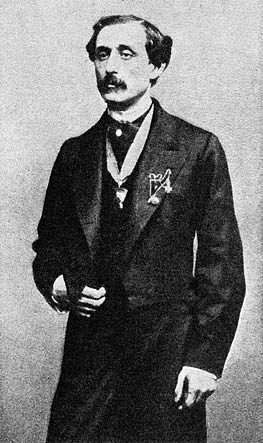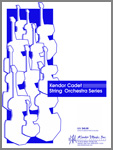Souvenir de Porto Rico
Buy this item (in stock)
Product ID: KM2 K9486
By Louis M. Gottschalk
Publisher:
Kendor Music
Arranger:
Frost
Series:
Kendor Cadet String Orchestra Series
Line Up:
String Orchestra
Level: 2+
Set & Score
This item is in stock
About this item
Subtitled March of the Gibaros (Peasants), this is one of the finest works ever written by pianist/composer Louis Gottschalk. In this adaptation for student strings, players must make a clean distinction between the melodic and accompaniment elements. The overall dynamic scheme will also require attention since this programmatic music depicts a passing procession (soft to loud to soft as the parade approaches and departs). With the exception of two chordal sections, driving rhythms are typical.
Reviews and rating
No review available, be the first to write one!

Composer
Louis M. Gottschalk (1829-1869)

Louis Moreau Gottschalk (May 8, 1829 – December 18, 1869) was an American composer and pianist, best known as a virtuoso performer of his own romantic piano works. He spent most of his working career outside of the United States.
Gottschalk was born to a Jewish businessman from London and a Creole mother in New Orleans, where he was exposed to a variety of musical traditions. He had six brothers and sisters, five of whom were half-siblings by his father's mulatto mistress.[1] His family lived for a time in a tiny cottage at Royal and Esplanade in the Vieux Carré. Louis later moved in with relatives at 518 Conti Street; his maternal grandmother Buslé and his nurse Sally had both been born in Saint-Domingue (known later as Haiti). Gottschalk played the piano from an early age and was soon recognized as a wunderkind by the New Orleans bourgeois establishment. In 1840, he gave his informal public debut at the new St. Charles Hotel.
Only two years later at the age of 13, Gottschalk left the United States and sailed to Europe, as he and his father realized a classical training was required to fulfill his musical ambitions. The Paris Conservatoire, however, rejected his application without hearing him on the grounds of his nationality; Pierre Zimmermann, head of the piano faculty, commented that "America is a country of steam engines". Gottschalk gradually gained access to the musical establishment through family friends.
After Gottschalk returned to the United States in 1853, he traveled extensively; a sojourn in Cuba during 1854 was the beginning of a series of trips to Central and South America. By the 1860s, Gottschalk had established himself as the best known pianist in the New World. Although born and reared in New Orleans, he was a supporter of the Union cause during the American Civil War. He returned to his native city only occasionally for concerts, but Gottschalk always introduced himself as a New Orleans native.
In May 1865, he was mentioned in a San Francisco newspaper as having "travelled 95,000 miles by rail and given 1,000 concerts". However, he was forced to leave the United States later that year because of a scandalous affair with a student at the Oakland Female Seminary in Oakland, California. He never returned to the U.S.
More info about the composer...



 Click above to view samples
Click above to view samples
